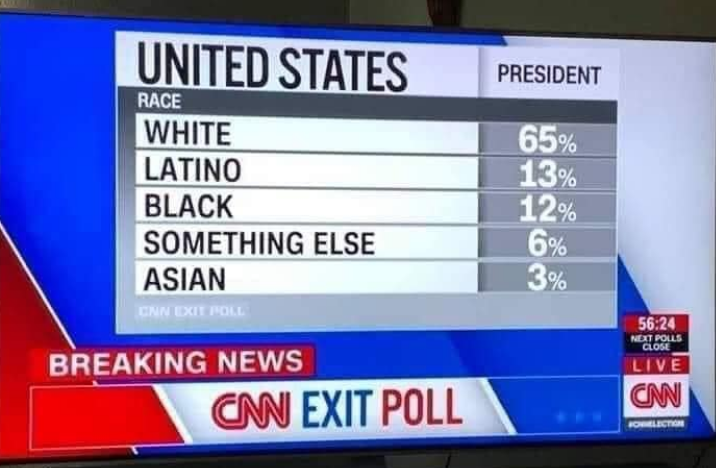
- Details
- By Native News Online Staff
ATLANTA — Through the years, getting thrown into the “other” box when being identified by demographers has caused angst among American Indians and Alaska Natives. Some tribal leaders have given getting past “other” speeches to get more respect for the labels put on Native people.
During CNN’s coverage of the 2020 election Tuesday night, producers unveiled a new term: “Something Else.”
The slide used to breakdown voting percentages of racial/ethic groups read like this:
- White
- Latino
- Black
- Something Else
- Asian
“All I can say is, unbelievable,” reacted Little River Band of Ottawa Indians Ogema Larry Romanelli in an email on Wednesday to the “something else” label.
Native Americans began posting memes and “something else” comments on social media.
“Something else? That’s horrible. And yes, Native Americans exist and have a voice. Keep speaking up,” one Facebook post read.
In Chicago, Native artist Santiago X came up with a t-shirt using the novel idea of calling Native people something else.
Native American cartoonist Ricardo Caté found the humor in the new label.
The new label inspired Rainy Dawn Ortiz to pen “More than something else.” The daughter of Joy Harjo, the United States Poet Laureate, and Simon Oritiz, Rainy Dawn’s talent shines throughout the poetry.
More Than Something Else
Something Else.
Some one else
Some where else
That place is here,
In my home,
We are here.
I am brown,
Brown hair,
Brown eyes,
Like cookies Feather tells me, and I like to think it’s perfectly cooked Pueblo cookies.
My kids are something else,
9 different shades of brown,
All beautiful.
My grandkids are something else,
4 brown eyes, 2 blue eyes,
All Native,
Definitely something else, as I watch them be rowdy, be loving, be here in this world.
We are here
On this earth
In this time and place
In our homes,
On our lands,
In the cities,
With our families, laughing loudly, cooking together, protecting each other.
We are something else
With our songs
Our dances.
We pray with corn meal,
Eagle feathers,
Medicine bundles,
Burn some sage, make sure to acknowledge the four directions, as the sun comes up.
We are the something else,
Who were here,
To greet Christopher Columbus
We were born from
This earth,
Crawled out of the center,
Of our mothers womb, we are important, we are strong.
We are something else,
We are Pueblo people, Plains people, Forest People, Desert people, Nomadic people, Cliff dwellers, Ocean fishers, Lake and river fishers, hunters,, medicine collectors, horse riders, artists, speakers, lawyers, doctors, teachers, we are human beings.
We are something else,
We are Native People,
Indigenous to this land.
We are a proud,
Something else.
Rainy Dawn Ortiz, November 4th, 2020
More Stories Like This
Native News Weekly (August 25, 2024): D.C. BriefsCheyenne River Youth Project to Celebrate Women’s Strength at Barbie-Themed Passion for Fashion on March 14
Celebrating Native American Women
Native Bidaské: The Illusion of Freedom and the Myth of America 250, Leonard Peltier Speaks Out
Monday Morning (March 2, 2026): Articles You May Have Missed This Past Weekend
Help us defend tribal sovereignty.
At Native News Online, our mission is rooted in telling the stories that strengthen sovereignty and uplift Indigenous voices — not just at year’s end, but every single day.
Because of your generosity last year, we were able to keep our reporters on the ground in tribal communities, at national gatherings and in the halls of Congress — covering the issues that matter most to Indian Country: sovereignty, culture, education, health and economic opportunity.
That support sustained us through a tough year in 2025. Now, as we look to the year ahead, we need your help right now to ensure warrior journalism remains strong — reporting that defends tribal sovereignty, amplifies Native truth, and holds power accountable.
 The stakes couldn't be higher. Your support keeps Native voices heard, Native stories told and Native sovereignty defended.
The stakes couldn't be higher. Your support keeps Native voices heard, Native stories told and Native sovereignty defended.
Stand with Warrior Journalism today.
Levi Rickert (Potawatomi), Editor & Publisher

